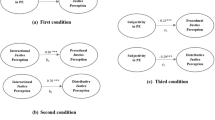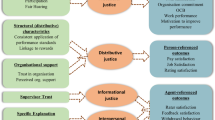Abstract
The interrelatedness of procedural and distributive justice has implications for organizational practice, especially in the area of performance appraisal. I explore these implications by first describing how procedures can influence perceptions of distributive justice: Procedural improprieties can bring to mind the possibility that a more just outcome might have been obtained if only more acceptable practices had been followed. Next I discuss a second form of interrelatedness — how distributive consequences can influence perceptions of procedural justice — by suggesting that the fairness of a procedure can be assessed in terms of its “expected-value” (typical or most probable) outcome. These points are illustrated by a discussion of howvoice, or the opportunity for employees to contribute information during the performance appraisal process, can affect both appraisal accuracy and perception of fairness.
Similar content being viewed by others
References
Adams, J. S. (1965). Inequity in social exchange. In Berkowitz, L. (ed.),Advances in Experimental Social Psychology, Vol. 2, Academic Press, New York, pp. 267–299.
Dipboye, R. L., and de Pontbriand, R. (1981). Correlates of employee reactions to performance appraisals and appraisal systems.J. Appl. Psychol. 66: 248–251.
Folger, R. (1986a). A referent cognitions theory of relative deprivation. In Olson, J. M., Herman, C. P., and Zanna, M. P. (eds.),Relative Deprivation and Social Comparison: The Ontario symposium, Vol. 4, Lawrence Erlbaum Associates, Hillsdale, NJ.
Folger, R. (1986b). Rethinking equity theory: A referent cognitions model. In Bierhoff, H. W., Cohen, R. L., and Greenberg, J. (eds.),Justice in Social Relations Plenum Press, New York.
Folger, R. (1987). Reformulating the preconditions of resentment: A referent cognitions model. In Master, J. C., and Smith, W. P. (eds.),Social Comparison, Social Justice, and Relative Deprivation: Theoretical, Empirical, and Policy Perspectives Lawrence Erlbaum Associates, Hillsdale, NJ.
Folger, R., and Greenberg, J. (1985). Procedural justice: An interpretive analysis of personal systems. In Rowland, K. M., and Ferris, G. R. (eds.),Research in Personnel and Human Resources Management, Vol. 3, JAI Press, Greenwich, CT, pp. 141–183.
Folger, R., and Martin, C. (1986). Relative deprivation and referent cognitions: Distributive and procedural justice effects.J. Exp. Soc. Psychol. 22: 531–546.
Folger, R., Rosenfield, D., Rheaume, K., and Martin, C. (1983a). Relative deprivation and referent cognitions.J. Exp. Soc. Psychol. 19: 172–184.
Folger, R., Rosenfield, D., and Robinson, T. (1983b). Relative deprivation and procedural justification.J. Pers. Soc. Psychol. 45: 268–273.
Greenberg, J. (1986). Organizational performance appraisal procedures: What makes them fair? In Lewicki, R. J., Bazerman, M. H., and Sheppard, B. H. (eds.),Research on Negotiating in Organizations JAI Press, Greenwich, CT.
Greenberg, J. (in press). The distributive justice of organizational performance appraisals. In Bierhoff, H. W., Cohen, R. L., and Greenberg, J. (eds.),Justice in Social Relations, Plenum Press, New York.
Greenberg, J., and Folger, R. (1983). Procedural justice, participation, and the fair process effect in groups and organizations. In Paulus, P. B. (ed.),Basic Group Processes Springer-Verlag, New York, pp. 235–256.
Greenberg, J., Mark, M. M., and Lehman, D. R. (1985). Justice in sports and games.J. Sport Behav. 8: 18–33.
Ilgen, D. R., and Feldman, J. M. (1983). Performance appraisal: A process focus. In Staw, B. M., and Cummings, L. L. (eds.),Research in Organizational Behavior Vol. 5, JAI Press, Greenwich, CT, pp. 141–197.
Jones, E. E., and Nisbett, R. E. (1972). The actor and the observer: Divergent perceptions of the causes of behavior. In Jones, E. E.,et al. (eds.),Attribution: Perceiving the Causes of Behavior General Learning Press, Morristown, NJ: pp. 79–94.
Kahneman, D., and Tversky, A. (1982). Availability and the simulation heuristic. In Kahneman, D., Slovic, P., and Tversky, A. (eds.)Judgment Under Uncertainty: Heuristics and Biases Cambridge University Press, New York, pp. 201–208.
Kanfer, R., Sawyer, J., Early, C., and Lind, E. A. (1987). Fairness and participation in evaluation procedures: Effects on task attitudes and performance.Soc. Justice Res. 1: 235–250.
Landy, F. J., Barnes, J. L., and Murphy, K. R. (1978). Correlates of perceived fairness and accurace of performance evaluation.J. Appl. Psychol. 63: 751–754.
Landy, F. J., Barnes-Farrell, J., and Cleveland, J. N. (1980). Perceived fairness and accuracy of performance evaluation: A follow-up.J. Appl. Psychol. 65: 355–356.
Leventhal, G. S. (1980). What should be done with equity theory? In Gergen, K. J., Greenberg, M. S., and Willis, R. H. (eds.),Social Exchange: Advances in Theory and Research Plenum Press, New York, pp. 27–55.
Lissak, R. I. (1983).Procedural Fairness: How Employees Evaluate Procedures. Unpublished dissertation, University of Illinois, Champaign.
Pauly, M. V., and Willett, T. D. (1968). Who “should” bear the burden of national defense? In Miller, J. C. (ed.),Why the Draft? The Case for a Volunteer Army Penguin Book, Baltimore, pp. 58–68.
Pauly, M. V., and Willett, T. D. (1972). Two concepts of equity and their implications for public policy.Soc. Sci. Quart. 53: 8–19.
Sheppard, B. H. (1984). Third party conflict intervention: A procedural framework. In B. M. Staw, and Cummings, L. L. (eds.),Research in Organizational Behavior JAI Press, Greenwich, CT, pp. 141–190.
Thibaut, J., and Walker, L. (1975).Procedural Justice: A Psychological Analysis Lawrence Erlbaum Associates, Hillsdale, NJ.
Thibaut, J., and Walker, L. (1978). A theory of procedure.Calif. Law Rev. 66: 541–566.
Tyler, T. R. (1984). The role of perceived injustice in defendants' evaluations of their courtroom experience.Law Soc. Rev. 18: 101–124.
Watson, D. (1982). The actor and the observer: How are their perceptions of causality divergent?Psychol. Bull. 92: 682–700.
Author information
Authors and Affiliations
Rights and permissions
About this article
Cite this article
Folger, R. Distributive and procedural justice in the workplace. Soc Just Res 1, 143–159 (1987). https://doi.org/10.1007/BF01048013
Issue Date:
DOI: https://doi.org/10.1007/BF01048013




